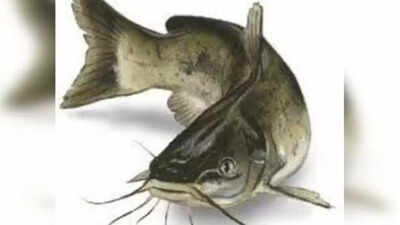In regions where fish is a dietary cornerstone, particularly when paired with rice, the importance of selecting safe and sustainable varieties cannot be overstated. While most fish pose no threat and offer nutritional benefits, the Thai Mangur fish, also known as Thai Catfish, stands out as a significant concern due to its detrimental health and environmental impacts.

Despite a government-imposed ban that has been in effect since 2000, this species continues to be illegally farmed and sold across numerous regions in India, thereby exposing the public to grave health risks. The prohibition stems from the fish's association with serious health hazards and ecological devastation, including a 70% reduction in native fish populations and severe disruption of India's aquatic ecosystems.
The Thai Mangur is a hybrid catfish species, initially cultivated for its rapid growth rate and adaptability. It is an exotic species introduced from outside India. Being carnivorous, it poses a threat to other fish in India, severely impacting aquatic habitats.
While its popularity once grew due to its ease of farming and fast development, the Thai Mangur quickly became a pressing concern for both public health and the environment, leading to its legal ban in India, encompassing its farming, sale, and consumption.
According to News 18, both the Indian government and various regulatory bodies have banned Thai Mangur due to its detrimental effects on health and the environment.
The National Green Tribunal (NGT) took action as early as 2000, prohibiting its cultivation due to the fish's carnivorous nature and its capacity to destabilize aquatic ecosystems.
As a leading voice in fisheries health and safety, the cultivation, sale, and consumption of Thai Mangur fish are not only illegal but also extremely risky to human health. Those who violate this ban may face strict legal action under national laws.
Dr. Priyanka Arya, Assistant Director of the Aligarh Fisheries Department, cautions that consuming Thai Mangur fish may elevate the risk of cancer.
The fish are frequently raised in unsanitary environments and fed a diet of rotting meat mixed with spinach, a practice that significantly contributes to water pollution and poses a direct threat to consumers. The fish has been linked to carcinogenic effects, making it one of the most harmful fish banned in India.
Beyond the immediate health risks, the Thai Mangur fish has inflicted substantial harm on India's aquatic ecosystems. Research indicates that this invasive species is responsible for a 70 percent decline in native fish species in India.
Due to its aggressive, carnivorous feeding habits, the Thai Mangur preys on smaller native fish, disrupting the ecological balance in rivers, lakes, and ponds.
Moreover, Thai Mangur frequently harbors parasites like fish lice, which can trigger epizootic outbreaks – sudden onsets of disease in aquaculture environments that can decimate entire fish populations.
The unsafe and unhygienic farming practices associated with Thai Mangur contribute significantly to its danger.
To maximize profits, some fish farmers feed these fish with decaying meat waste, often combined with leftover vegetables such as spinach. This practice not only contaminates the fish but also pollutes the surrounding water bodies, accelerating the destruction of aquatic ecosystems.
The ban on Thai Mangur is not merely advisory; it is rigorously enforced. The government has clearly stated that anyone involved in the cultivation, distribution, or consumption of Thai Mangur will face legal penalties. Government agencies, including the Fisheries Department, have been instructed to conduct raids and take appropriate legal action against offenders.
The Fisheries Department has also launched numerous awareness campaigns to educate the public about the dangers of consuming Thai Mangur, specifically highlighting its carcinogenic properties and the harmful nature of its rearing practices.
Newer articles
Older articles
 Vijay Officially Named TVK's Chief Minister Hopeful for Tamil Nadu's 2026 Election
Vijay Officially Named TVK's Chief Minister Hopeful for Tamil Nadu's 2026 Election
 RJ Mahvash Prioritizes Work Over Buzz, Addresses Link-Up Speculation
RJ Mahvash Prioritizes Work Over Buzz, Addresses Link-Up Speculation
 JPG to PDF: A Comprehensive Guide for Graphic Designers & Professionals
JPG to PDF: A Comprehensive Guide for Graphic Designers & Professionals
 UNESCO's World Heritage Wonders: Unveiling 10 Iconic Sites, From Petra to the Pyramids
UNESCO's World Heritage Wonders: Unveiling 10 Iconic Sites, From Petra to the Pyramids
 iQoo Z9 Turbo: Rumored Specs Emerge – Snapdragon 8s Gen 3, 6000mAh Battery Highlighted
iQoo Z9 Turbo: Rumored Specs Emerge – Snapdragon 8s Gen 3, 6000mAh Battery Highlighted
 Shadman Islam Defends Bangladesh Batters After Day 1 Struggles Against Sri Lanka
Shadman Islam Defends Bangladesh Batters After Day 1 Struggles Against Sri Lanka
 England's Bold Claim: Could They Have Chased Down 450 Against India?
England's Bold Claim: Could They Have Chased Down 450 Against India?
 5 Often-Missed Warning Signs of Bladder Cancer You Need to Know
5 Often-Missed Warning Signs of Bladder Cancer You Need to Know
 KL Rahul Puts Country First, Prioritizes England Tests Over Newborn Child
KL Rahul Puts Country First, Prioritizes England Tests Over Newborn Child
 Tick Bite Paralyzes Fitness Influencer: A Wake-Up Call for Outdoor Enthusiasts
Tick Bite Paralyzes Fitness Influencer: A Wake-Up Call for Outdoor Enthusiasts